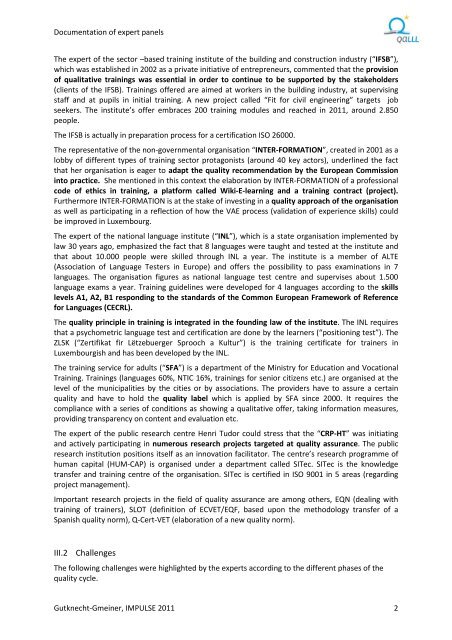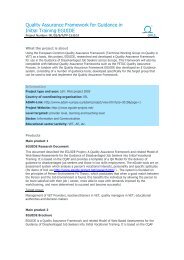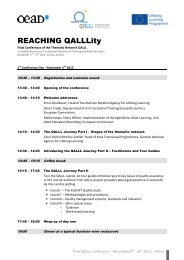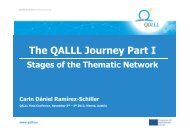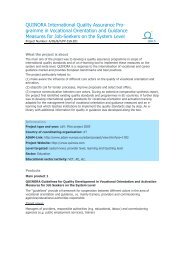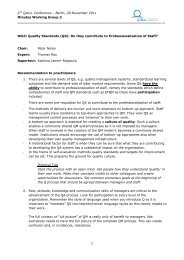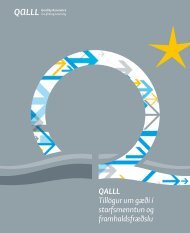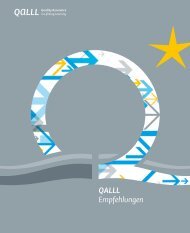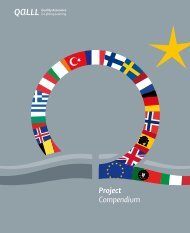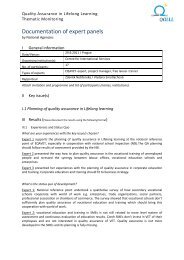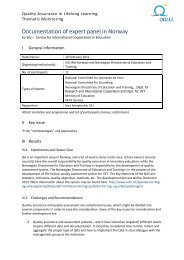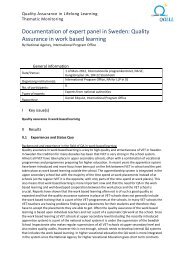Documentation expert panel LU - QALLL
Documentation expert panel LU - QALLL
Documentation expert panel LU - QALLL
You also want an ePaper? Increase the reach of your titles
YUMPU automatically turns print PDFs into web optimized ePapers that Google loves.
<strong>Documentation</strong> of <strong>expert</strong> <strong>panel</strong>s<br />
The <strong>expert</strong> of the sector –based training institute of the building and construction industry (“IFSB”),<br />
which was established in 2002 as a private initiative of entrepreneurs, commented that the provision<br />
of qualitative trainings was essential in order to continue to be supported by the stakeholders<br />
(clients of the IFSB). Trainings offered are aimed at workers in the building industry, at supervising<br />
staff and at pupils in initial training. A new project called “Fit for civil engineering” targets job<br />
seekers. The institute’s offer embraces 200 training modules and reached in 2011, around 2.850<br />
people.<br />
The IFSB is actually in preparation process for a certification ISO 26000.<br />
The representative of the non-governmental organisation “INTER-FORMATION”, created in 2001 as a<br />
lobby of different types of training sector protagonists (around 40 key actors), underlined the fact<br />
that her organisation is eager to adapt the quality recommendation by the European Commission<br />
into practice. She mentioned in this context the elaboration by INTER-FORMATION of a professional<br />
code of ethics in training, a platform called Wiki-E-learning and a training contract (project).<br />
Furthermore INTER-FORMATION is at the stake of investing in a quality approach of the organisation<br />
as well as participating in a reflection of how the VAE process (validation of experience skills) could<br />
be improved in Luxembourg.<br />
The <strong>expert</strong> of the national language institute (“INL”), which is a state organisation implemented by<br />
law 30 years ago, emphasized the fact that 8 languages were taught and tested at the institute and<br />
that about 10.000 people were skilled through INL a year. The institute is a member of ALTE<br />
(Association of Language Testers in Europe) and offers the possibility to pass examinations in 7<br />
languages. The organisation figures as national language test centre and supervises about 1.500<br />
language exams a year. Training guidelines were developed for 4 languages according to the skills<br />
levels A1, A2, B1 responding to the standards of the Common European Framework of Reference<br />
for Languages (CECRL).<br />
The quality principle in training is integrated in the founding law of the institute. The INL requires<br />
that a psychometric language test and certification are done by the learners (“positioning test”). The<br />
ZLSK (“Zertifikat fir Lëtzebuerger Sprooch a Kultur”) is the training certificate for trainers in<br />
Luxembourgish and has been developed by the INL.<br />
The training service for adults (“SFA”) is a department of the Ministry for Education and Vocational<br />
Training. Trainings (languages 60%, NTIC 16%, trainings for senior citizens etc.) are organised at the<br />
level of the municipalities by the cities or by associations. The providers have to assure a certain<br />
quality and have to hold the quality label which is applied by SFA since 2000. It requires the<br />
compliance with a series of conditions as showing a qualitative offer, taking information measures,<br />
providing transparency on content and evaluation etc.<br />
The <strong>expert</strong> of the public research centre Henri Tudor could stress that the “CRP-HT” was initiating<br />
and actively participating in numerous research projects targeted at quality assurance. The public<br />
research institution positions itself as an innovation facilitator. The centre’s research programme of<br />
human capital (HUM-CAP) is organised under a department called SITec. SITec is the knowledge<br />
transfer and training centre of the organisation. SITec is certified in ISO 9001 in 5 areas (regarding<br />
project management).<br />
Important research projects in the field of quality assurance are among others, EQN (dealing with<br />
training of trainers), SLOT (definition of ECVET/EQF, based upon the methodology transfer of a<br />
Spanish quality norm), Q-Cert-VET (elaboration of a new quality norm).<br />
III.2 Challenges<br />
The following challenges were highlighted by the <strong>expert</strong>s according to the different phases of the<br />
quality cycle.<br />
Gutknecht-Gmeiner, IMPULSE 2011 2


